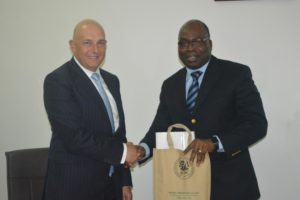Tough Days await Illegal Migrants as Canada seeks ICPC Intervention

The
Canadian government is seeking the expertise of the Independent Corrupt
Practices and Other Related Offences Commission (ICPC) to help it stem
the tide of illegal migration by Nigerian citizens into its country.
This was the purpose of a meeting between ICPC on one hand, and the Immigration, Refugees and Citizenship Canada (IRCC) and Canada Border Services Agency (CBSA) on the other hand, when the two agencies under the auspices of the Canadian Foreign Ministry paid a courtesy call to the ICPC headquarters in Abuja, recently.
Speaking on the purpose of the visit, the Director, (IRCC), Mr. Glen Linder, said that they had come to ICPC to explore ways of working with the Commission to address cases of irregular migration by Nigerians into Canada, which constituted a problem for them.
According to him, “We are aware that this Commission has powers to enforce the Corrupt Practices and Other Related Offences Act, and that you have a great deal of expertise in dealing with travelling documents-related crimes.”
He revealed that in the last two years, about 15,000 Nigerians sneaked into Canada illegally, and that the Canada High Commission would like ICPC to assist it in terms of identifying visas fraudulently procured in Nigeria, and also verifying the documents presented when processing these visas.
While expressing confidence in the capability of the Commission to make the partnership fruitful, Mr. Glen explained that his agency would further wish to work with ICPC “to develop and promote regular migration” which he said would be beneficial to both Nigeria and Canada.
He also pledged his country’s support in assisting Nigeria with capacity building in respect of immigration and border issues.
Speaking also during the visit, Mr. Yannick Lamonde, Head of CBSA expressed concern at the rate at which Nigerians intending to travel to Canada fall victim to fraudsters, and said his agency would like to collaborate with ICPC to prevent more Nigerians from being swindled through irregular migration.
“It is sad to see that some Nigerians are being taken advantage of through other ways pretending that they could go to Canada the wrong way and live there,” he lamented.
Lamonde urged Nigerians intending to travel to Canada to follow the legal path: “We had a lot of visa issued to Nigerian citizens for permanent residence and Canadian citizenship recently.”
He also expressed the desire of his agency to work with ICPC in identifying, investigating and prosecuting those found to be involved in the processing of fake documents for migration to Canada, while further soliciting for collaboration in the area of exchange of information.
The ICPC Chairman, Professor Bolaji Owasanoye, in his response expressed the willingness of the Commission to exchange information and partner with the two agencies, saying that it would help in improving the image of Nigeria internationally.
He noted that people who migrated illegally diminished the image of the country while making it difficult for legitimate applicants to get through.
Professor Owasanoye also said that the Commission already had a collaboration with the Nigeria Immigration Service (NIS) towards dealing with the issue of fake visas into Nigeria from foreign countries.
Regarding visas fraudulently procured in Nigeria , the ICPC Chairman stated that some of the people caught in this web of criminality had been facilitated by public officers who included their names in legitimate applications.
He further revealed that ICPC had in the past few years assisted and worked with embassies who were also concerned about the issue of irregular migration, noting that the Commission had a memorandum (MOU) of understanding with the British High Commission towards addressing similar concerns.
While appreciating the visitors for the offer of collaboration which extends to capacity building, the ICPC boss pointed out that the British High Commission in addition to capacity building had donated technical equipment to help facilitate investigation with software that could be used for forensic analysis, detecting and unravelling fake documents, etc. He expressed the hope that a similar facility would be part of the package in the collaboration with the Canadian government.
This was the purpose of a meeting between ICPC on one hand, and the Immigration, Refugees and Citizenship Canada (IRCC) and Canada Border Services Agency (CBSA) on the other hand, when the two agencies under the auspices of the Canadian Foreign Ministry paid a courtesy call to the ICPC headquarters in Abuja, recently.
Speaking on the purpose of the visit, the Director, (IRCC), Mr. Glen Linder, said that they had come to ICPC to explore ways of working with the Commission to address cases of irregular migration by Nigerians into Canada, which constituted a problem for them.
According to him, “We are aware that this Commission has powers to enforce the Corrupt Practices and Other Related Offences Act, and that you have a great deal of expertise in dealing with travelling documents-related crimes.”
He revealed that in the last two years, about 15,000 Nigerians sneaked into Canada illegally, and that the Canada High Commission would like ICPC to assist it in terms of identifying visas fraudulently procured in Nigeria, and also verifying the documents presented when processing these visas.
While expressing confidence in the capability of the Commission to make the partnership fruitful, Mr. Glen explained that his agency would further wish to work with ICPC “to develop and promote regular migration” which he said would be beneficial to both Nigeria and Canada.
He also pledged his country’s support in assisting Nigeria with capacity building in respect of immigration and border issues.
Speaking also during the visit, Mr. Yannick Lamonde, Head of CBSA expressed concern at the rate at which Nigerians intending to travel to Canada fall victim to fraudsters, and said his agency would like to collaborate with ICPC to prevent more Nigerians from being swindled through irregular migration.
“It is sad to see that some Nigerians are being taken advantage of through other ways pretending that they could go to Canada the wrong way and live there,” he lamented.
Lamonde urged Nigerians intending to travel to Canada to follow the legal path: “We had a lot of visa issued to Nigerian citizens for permanent residence and Canadian citizenship recently.”
He also expressed the desire of his agency to work with ICPC in identifying, investigating and prosecuting those found to be involved in the processing of fake documents for migration to Canada, while further soliciting for collaboration in the area of exchange of information.
The ICPC Chairman, Professor Bolaji Owasanoye, in his response expressed the willingness of the Commission to exchange information and partner with the two agencies, saying that it would help in improving the image of Nigeria internationally.
He noted that people who migrated illegally diminished the image of the country while making it difficult for legitimate applicants to get through.
Professor Owasanoye also said that the Commission already had a collaboration with the Nigeria Immigration Service (NIS) towards dealing with the issue of fake visas into Nigeria from foreign countries.
Regarding visas fraudulently procured in Nigeria , the ICPC Chairman stated that some of the people caught in this web of criminality had been facilitated by public officers who included their names in legitimate applications.
He further revealed that ICPC had in the past few years assisted and worked with embassies who were also concerned about the issue of irregular migration, noting that the Commission had a memorandum (MOU) of understanding with the British High Commission towards addressing similar concerns.
While appreciating the visitors for the offer of collaboration which extends to capacity building, the ICPC boss pointed out that the British High Commission in addition to capacity building had donated technical equipment to help facilitate investigation with software that could be used for forensic analysis, detecting and unravelling fake documents, etc. He expressed the hope that a similar facility would be part of the package in the collaboration with the Canadian government.







No comments